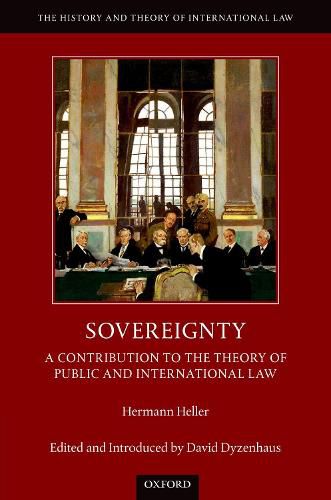Readings Newsletter
Become a Readings Member to make your shopping experience even easier.
Sign in or sign up for free!
You’re not far away from qualifying for FREE standard shipping within Australia
You’ve qualified for FREE standard shipping within Australia
The cart is loading…






Hermann Heller was one of the leading public lawyers and legal and political theorists of the Weimar era, whose main interlocutors were two of the giants of twentieth century legal and political thought, Hans Kelsen and Carl Schmitt. In this 1927 work, Hermann Heller addresses the paradox of sovereignty. That is, how the sovereign can be both the highest authority and subject to law. Unlike Kelsen and Schmitt, who seek to dissolve the paradox, Heller sees that the tensions the paradox highlights are an essential part of a society ruled by law.
Sovereignty, in the sense of national and popular sovereignty, is often perceived today as being under threat, as power devolves from nation states to international bodies, and important decisions seem increasingly made by elite-dominated institutions. Hermann Heller wrote Sovereignty in 1927 amidst the very similar tensions of the Weimar Republic. In an exploration of history, constitutional and political theory, and international law, Heller speaks clearly to our contemporary concerns, and shows that democrats must defend a legal idea of sovereignty suitable for a pluralistic world.
$9.00 standard shipping within Australia
FREE standard shipping within Australia for orders over $100.00
Express & International shipping calculated at checkout
Hermann Heller was one of the leading public lawyers and legal and political theorists of the Weimar era, whose main interlocutors were two of the giants of twentieth century legal and political thought, Hans Kelsen and Carl Schmitt. In this 1927 work, Hermann Heller addresses the paradox of sovereignty. That is, how the sovereign can be both the highest authority and subject to law. Unlike Kelsen and Schmitt, who seek to dissolve the paradox, Heller sees that the tensions the paradox highlights are an essential part of a society ruled by law.
Sovereignty, in the sense of national and popular sovereignty, is often perceived today as being under threat, as power devolves from nation states to international bodies, and important decisions seem increasingly made by elite-dominated institutions. Hermann Heller wrote Sovereignty in 1927 amidst the very similar tensions of the Weimar Republic. In an exploration of history, constitutional and political theory, and international law, Heller speaks clearly to our contemporary concerns, and shows that democrats must defend a legal idea of sovereignty suitable for a pluralistic world.